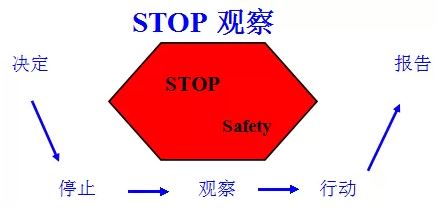有關(guān)STOP(safety training observation program)“行為觀察”的雙語(yǔ)分享(一)
STOP的“戶(hù)口”分享
STOP? 安全觀察與溝通項(xiàng)目(Safety Training &Observation Program)是杜邦公司從200多年的安全管理實(shí)踐中提煉總結(jié)出來(lái)的一種針對(duì)個(gè)人行為安全改進(jìn)與提升的方法,大家普遍簡(jiǎn)稱(chēng)為STOP?。STOP? 安全觀察與溝通項(xiàng)目通過(guò)訓(xùn)練企業(yè)員工在日常工作中對(duì)于個(gè)人的不安全行為和周遭的不安全環(huán)境狀況采取行動(dòng),幫助員工改進(jìn)不安全行為,提高安全意識(shí),培養(yǎng)安全習(xí)慣,以達(dá)到提升企業(yè)安全績(jī)效的目的。STOP?安全觀察與溝通項(xiàng)目還有助于培養(yǎng)個(gè)人觀察及溝通技巧,使你能采取積極而正面的步驟,確保一個(gè)更安全的工作場(chǎng)所。
STOP行為觀察溝通通常是這樣執(zhí)行的:

1.Reactions of People 人員的反應(yīng)
l Can you stop for a minute and tell me about the job you’re doing?可不可以耽誤你一分鐘的時(shí)間?請(qǐng)告訴我你正在進(jìn)行的工作是什么
l What personal protective equipment is required for the job? Is it always available? Is it in good condition? Have you received training in using this personal protective equipment?
在你的工作上需要哪些個(gè)人防護(hù)裝備?是不是每次都有個(gè)人防護(hù)裝備供你使用?裝備的狀況良好嗎?你是否接受過(guò)使用個(gè)人防護(hù)裝備的訓(xùn)練?
l What other position could you be in that would make this job safer?
你是否可以換到其它的工作位置,使得這項(xiàng)工作能進(jìn)行得更安全?
l How could you or someone else get hurt under these circumstances?
在這些狀況下,你或其他人可能會(huì)如何地受到傷害?
l What could happen if…?
如果一旦……可能會(huì)發(fā)生什么事?
l How can this job be done more safely?
你如何能使這項(xiàng)工作更安全?
2.Persona Protective Equipment 個(gè)人防護(hù)設(shè)備
l What are some potential safety risks on this job?
在這個(gè)工作上有哪些安全上潛在的危險(xiǎn)?
l What are you wearing to protect yourself from possible hazards?
你穿了哪些可以保護(hù)你不受潛在危險(xiǎn)傷害的衣物?
l What personal protective equipment is available to protect you from these hazards?
公司備有哪些個(gè)人防護(hù)裝備可以保護(hù)你不受到這些傷害?
l What is the difference between the clothing you wear off the job (for example, your own shoes) and the required personal protective equipment for this job (safely shoes)?
在你不上工時(shí)穿著的衣物(例如自己的鞋子)和在上工時(shí)穿著的個(gè)人防護(hù)裝備(如安全鞋)有何不同?
l What some of the common causes are of injures on this type of job?
在這一類(lèi)型的工作上有哪些常見(jiàn)原因會(huì)導(dǎo)致傷害?
l How can you keep from injuring yourself on this job?
如何能避免在工作上受到傷害?
l What parts of your body do you think need protection against the risks involved in you job?
你認(rèn)為,要避免在工作上受到傷害,你身體的哪些部位需要采取防護(hù)措施?
l What types of personal protective equipment are required for your job?
在你工作時(shí),需要哪些種類(lèi)的個(gè)人防護(hù)裝備?
l What training did you receive in the care and use of the personal protective equipment required for your job?
關(guān)于你工作上規(guī)定的個(gè)人防護(hù)裝備,你曾接受哪些維護(hù)與使用上的訓(xùn)練?
l Is the required personal protective equipment correct for the job?
規(guī)定的個(gè)人防護(hù)裝備是否適用于你的工作?
l How do you know the personal protective equipment is in good condition?
你如何知道個(gè)人防護(hù)裝備處于良好的狀況?
l Is the personal protective equipment used properly? What training is required?
個(gè)人防護(hù)裝備使用的方法是否正確?需要哪些訓(xùn)練?
l Does the personal protective equipment fit properly? How often do you fit-test?
個(gè)人防護(hù)裝備是否合身?你多久會(huì)試穿一次?
l How do you feel about wearing personal protective equipment now that we’ve talked?
關(guān)于我們現(xiàn)在討論的個(gè)人防護(hù)裝備,你對(duì)于它的穿戴有何看法?
l What other jobs do you do that require personal protective equipment?
你還有哪些工作需要穿著個(gè)人防護(hù)裝備?
- 上一篇:質(zhì)量管理知識(shí)100題,自測(cè)一下錯(cuò)幾個(gè)? 2014/11/3
- 下一篇:解讀《建筑設(shè)計(jì)防火規(guī)范》(GB50016-2014) 2014/11/3

 蘇公網(wǎng)安備:32050502000609號(hào)
蘇公網(wǎng)安備:32050502000609號(hào)